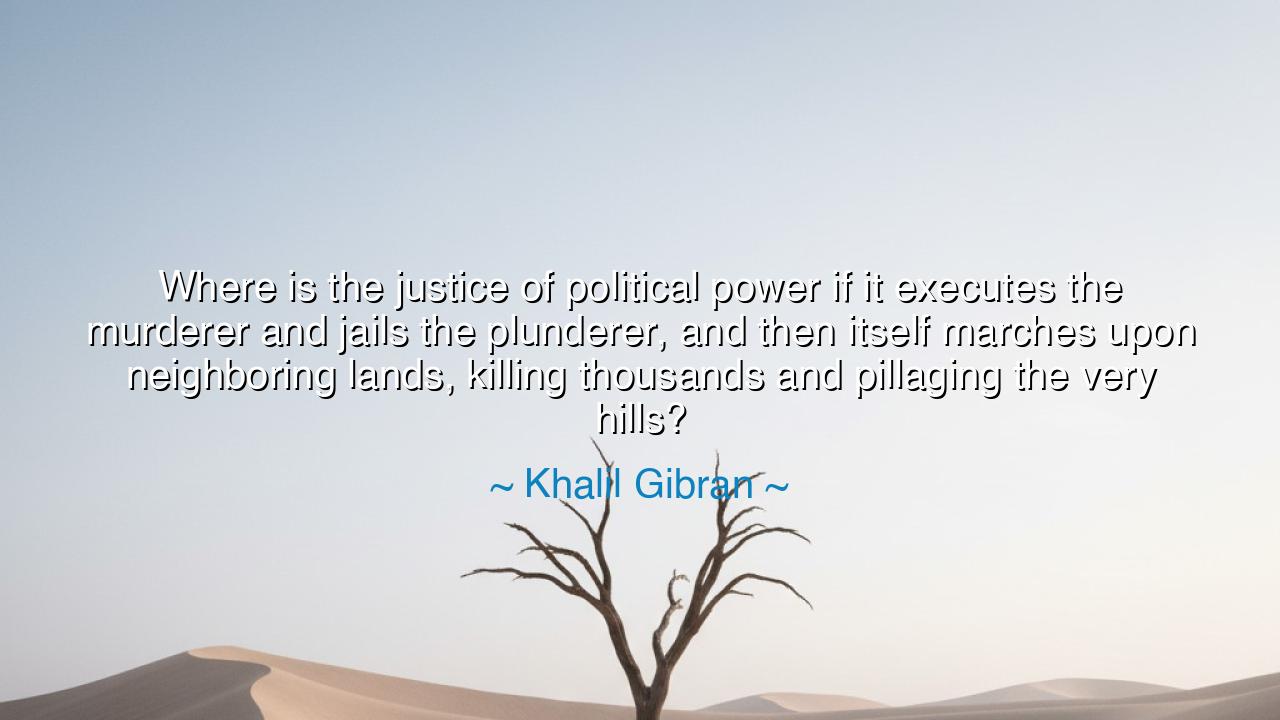
Where is the justice of political power if it executes the
Where is the justice of political power if it executes the murderer and jails the plunderer, and then itself marches upon neighboring lands, killing thousands and pillaging the very hills?






Hearken, O children of the ages, to the piercing voice of Khalil Gibran, who questions the very soul of justice within the halls of political power. He asks us to behold the contradiction of a state that punishes the murderer and confines the plunderer, yet turns its might outward to march upon distant lands, bringing death and devastation upon countless innocents. In this, Gibran teaches that justice is hollow when wielded selectively, and that the laws of men are empty if their rulers act with impunity.
Gibran’s words remind us that the measure of a government is not only how it governs its own, but how it conducts itself beyond its borders. To kill, to pillage, and to dominate others while proclaiming righteousness at home is a betrayal of the very principles of justice. The mantle of authority becomes a mask, hiding the contradictions between moral law and the exercise of power. True justice cannot be compartmentalized; it must shine equally upon the stranger as upon the citizen.
Consider the historical example of the Roman Empire, which prided itself on law, order, and civilization within its walls, yet carried legions across foreign lands, subjugating peoples, taking spoils, and leaving destruction in its wake. Here, as Gibran admonishes, the injustice of political might is revealed: the state punishes some while committing crimes of far greater scale upon others. The lesson echoes through the ages: authority divorced from conscience is tyranny cloaked in the guise of justice.
Even in modern times, the principle persists. Governments that intervene in foreign lands under the banner of freedom or security, yet cause untold suffering, embody the same contradiction Gibran identifies. Power that is exercised without moral consistency, that kills, destroys, and seizes while punishing lesser crimes at home, erodes the legitimacy of law itself and sows resentment and chaos across generations.
O children of the future, carry this teaching in your hearts: question the claims of justice when wielded by the mighty. Seek rulers and laws that align power with morality, that punish wrongdoing within while refusing to commit it without. True justice shines not in selective vengeance, but in the courage to uphold right across every land, every life, and every act.
If you desire, I can also craft a visual, ancient scroll-style presentation of this passage to capture the heroic, timeless, and deeply evocative essence of Gibran’s meditation on justice, power, and conscience.






TLtruong thi loi
I can’t help but wonder, does this quote imply that all political power is inherently corrupt? While there’s no denying that power often leads to abuses, is it possible for governments to truly serve justice without falling into the same pitfalls? Perhaps the real issue is not with political power itself, but with the systems of governance that allow these contradictions to persist. Is there a way for power to be exercised more ethically without creating such glaring injustices?
K9Nguyen khanh 9a5
This quote seems to challenge the very foundation of political authority. It’s easy to criticize individuals for their wrongdoings, but how do we address the larger, systemic issues that enable such hypocrisy on the global stage? When a government commits acts of violence and exploitation, it often becomes more difficult for its citizens to distinguish right from wrong. How can citizens hold their leaders accountable when the government itself sets such an example of injustice?
MLmessi lionel
It’s interesting how Khalil Gibran highlights the contradiction in political power’s sense of justice. It reminds me of how governments often justify wars and invasions by labeling them as ‘defensive’ or ‘for peace,’ yet the consequences are anything but. How can we reconcile the idea of justice with the violence that often accompanies the exercise of political power? This makes me question the integrity of many political systems and whether they truly seek peace or simply maintain control.
Aadfghj
This quote really makes me think about the double standards that often exist in political power. How can a nation claim to uphold justice when its leaders are engaging in violence and exploitation on a larger scale? Isn’t there a hypocrisy in punishing individuals for the same actions that the state itself commits? It’s as if the concept of justice is only selectively applied, which is deeply troubling. Can true justice ever exist when power is wielded so unevenly?